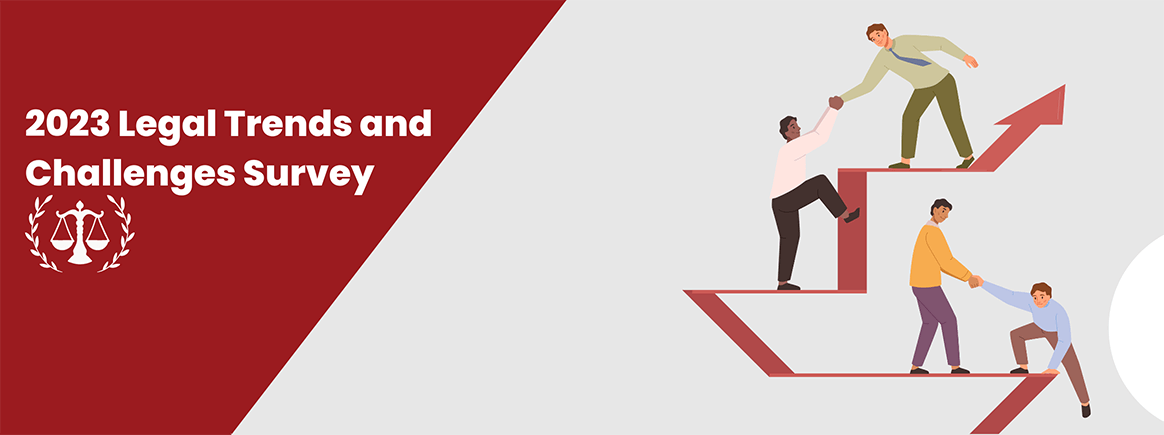
Key Challenges Law Firms Face in 2023
The Canadian legal landscape had remained fairly consistent for years with slow and steady growth, but the onset of COVID in 2020 forced firms to make a shift. While the pandemic has now receded, its effects are still felt. Increases in technological use, difficulty in finding and retaining talent, and an ever growing financial pressure are among the few key challenges law firms face in 2023.
Evolving Technological Landscape
As we delve further into 2023, law firms face a multitude of challenges in navigating the evolving technological landscape. This section explores the impact of technology on law firms, the integration of automation and artificial intelligence (AI), and the challenges of adopting and adapting to new technologies.
Technologies such as AI are becoming more popular and they have the potential to revolutionize the legal profession. These technologies can not only streamline processes and enhance efficiency, but also enable data-driven decision-making. This technology can automate tasks like contract review, legal research, and due diligence, freeing up lawyers' time for higher-level tasks and strategic thinking.
In the past three years, we have seen a significant increase in the utilization of legal technologies by forward-thinking law firms. According to our 2022 Legal Survey, 41% of legal participants in Ontario said their firm had implemented new technology during the pandemic. These technologies were generally geared towards improving repetitive, non-revenue-producing tasks, such as billing and accounting, secure document delivery, and even file management processes.
For example, firms using Tracument to automate Requests can experience up to a 90% reduction in the time required for document request creation and management.
| Task | Time Without Tracument | Time With Tracument |
|---|---|---|
|
Request Letters |
8–12 minutes |
About the same amount of time to set up initially (with authorizations). It takes the same amound of time, however it is nice to have the authorizations accessible in the Tracument history as there are many instances where medical facilities etc. will return the whole request and ask that it be resent, e.g. if additional information is required. |
|
Reminders on Requests |
8–12 minutes |
30 seconds Sending a reminder is very fast — just a click of a button. You can also send reminders on multiple open requests at once. |
|
Cancellation of Requests |
8–12 minutes |
30 seconds It is extremely time-saving to be able to send a cancellation letter by simply clicking a button — especially when the file is settling. You can also cancel all open requests on a file at once. |
The integration of automation also presents challenges. While automation can enhance efficiency and accuracy, it also raises concerns about job displacement and the need for proper training. Firms must strike a balance between leveraging technology for the better while also ensuring that their staff are well-trained and valued, and always that legal expertise remains central.
There are also several challenges in implementing and adapting to technological changes. Resistance to change, concerns regarding data security and privacy, and the need for specialized training and technical support are foremost among these and must be managed. Additionally, the rapid pace of technological advancements necessitates continuous learning and a proactive approach to stay ahead of the curve. Law firms embracing technology must therefore carefully evaluate the potential benefits and risks.
Talent Management and Retention
The second key challenge is talent management and retention. This involves attracting and retaining top legal and support staff talent while not losing employees to your competition. Increasingly, this means meeting the expectations of younger employees in the workplace. This section delves into the evolving nature of talent management in the legal industry.
Law firms continually strive to attract and retain the best legal professionals in order to maintain a competitive edge. However, this task has recently become increasingly more demanding due to several factors:
-
Technological Advancements and Automation:
As noted above, the legal industry is witnessing a transformation driven by technological advancements and automation. The rise of artificial intelligence, machine learning, and legaltech tools has automated repetitive tasks, altering the nature of legal work. Additionally, some remote work freedom is now expected, and technology must be adequate to support that expectation. Law firms must embrace technology and demonstrate a commitment to innovation to appeal to top legal talent. -
Changing Preferences of Top Legal Talent:
In 2030, Generation Z and Millennials will make up more than half of the workforce. They will also become a significant portion of the legal workforce. These generations value work-life balance, flexible work arrangements, opportunities for growth and development, and a positive work culture. To attract top legal talent from this pool, firms must adapt to these preferences and create an environment that promotes their well-being and professional aspirations. Millennial and Gen Z employees are also motivated by work that has a positive impact on society. They seek opportunities to contribute meaningfully and align their personal values with the work they do. Law firms can attract and retain talent by also emphasizing their commitment to social responsibility, pro bono work, and diversity and inclusion initiatives.A study by Deloitte found that 84% of millennials consider work-life balance important, and 94% of Gen Z values work-life balance as a top priority when choosing a job.
-
Technological Advancements and Automation:
Millennial and Gen Z employees often place a stronger emphasis on continuous learning and development than their seasoned colleagues. They seek opportunities to acquire new skills, engage in mentorship programs, and receive regular feedback on their performance. Law firms must prioritize professional growth by offering training programs, mentorship opportunities, and clear career progression paths to remain competitive.Some law firms have implemented reverse mentoring programs, where younger employees mentor senior partners on technology, social media, and emerging trends. This creates a culture of knowledge sharing and fosters a sense of inclusivity.
Financial Pressures and Profitability
Law firms also encounter a range of financial pressures. This section focuses on the challenges arising from increased competition for legal services, the demand for cost-effective solutions, and the delicate balance between profitability and client satisfaction.
Law firms are experiencing heightened competition as new players, such as alternative legal service providers (ALSPs) and legal technology companies, enter the market. This increased competition poses several challenges to law firms' financial stability.
The legal marketplace is becoming more saturated. There is a wider array of choices for those seeking legal services. This increased competition can make it challenging for law firms to attract and retain clients, particularly when they have numerous options to consider. According to Clearway Law, there are 130,000 lawyers in Canada, with Ontario recently adding over 10,000 paralegals. This level of growth further intensifies competition in the legal services market.
Clients are increasingly seeking cost-effective legal solutions and alternative fee arrangements that provide more certainty and value. This demand for pricing transparency and cost predictability puts pressure on law firms to deliver services efficiently. Firms also face mounting pressure to provide cost-effective solutions to clients while maintaining profitability.
-
Competition from Alternative Legal Service Providers (ALSPs):
The emergence of alternative legal service providers (ALSPs) poses a significant challenge to traditional law firms. Their leaner business models and utilization of technology allows them to offer legal services at lower costs compared to traditional law firms. This creates pressure for law firms to identify innovative ways to deliver value and efficiency to clients. -
Client-Centric Approach:
To balance profitability and client satisfaction, law firms should adopt a client-centric approach. This involves understanding clients' needs, providing tailored solutions, and delivering exceptional service to build strong and loyal client relationships. Law firms also need to communicate the value they provide to clients and justify their fees based on the outcomes and results achieved. Demonstrating the value of their services helps in maintaining profitability while meeting client expectations. -
Balancing Profitability and Client Satisfaction:
Law firms must strike a delicate balance between maintaining profitability and ensuring client satisfaction. While financial success is essential, it should not come at the expense of client relationships and quality service. This can involve strategically managing staffing, utilizing technology and automation where appropriate, and implementing efficient workflows to increase productivity and reduce costs.Some law firms have even adopted project management methodologies to improve resource allocation and optimize workflows. By implementing these strategies, firms can improve efficiency, enhance profitability, and maintain client satisfaction.
Conclusion
Law firms face a multitude of challenges that demand their attention and will require adaptation. Whether it is fostering a culture that embraces technological advancements, understanding the changing preferences of the upcoming legal professionals, or navigating increased competition, allocating adequate time and energy is required to create the kind of balanced strategy that is key to continued success in the competitive legal industry of 2023.
While technology offers immense opportunities for law firms to enhance efficiency and improve client service, the challenge lies in effectively integrating and adapting to these new tools while ensuring data security and maintaining the human touch that clients value. — Legal Technology Expert
You may also like
Happy Holidays Message from David Swadden, CEO
December 18, 2025
We would like to wish all our clients and readers a wonderful holiday season filled with joy and laughter.
Tracument Holiday Schedule
December 11, 2025
We would like to update all our clients of our Holiday Schedule this holiday season!
Tracument Wrapped!
December 4, 2025
What 2025 Looked like for Tracument and for you!




